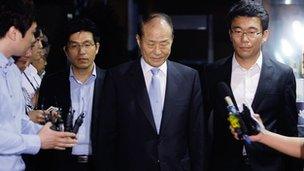South Korean President's brother Lee Sang-deuk arrested
- Published

South Korean President Lee Myung-bak's elder brother has been detained by police on corruption charges.
Former lawmaker Lee Sang-deuk faces allegations of taking 600m won (£338,200;$525,000) in bribes from the chairmen of two savings banks to help them avoid an audit.
The arrest warrant was approved by the Seoul Central District Court.
It is seen as a potential political setback for South Korea's conservative ruling party in an election year.
The case is the latest in a series of corruption scandals involving people with ties to South Korea's president, who ends his five-year term next February.
The presidential election takes place in December.
As Lee Sang-deuk arrived in court, angry depositors who lost money when the savings banks were suspended hurled eggs at him.
The 76-year-old, who served six terms in parliament, was reportedly taken to a detention centre immediately after the warrant was issued.
Banking scandal
There has been widespread anger among Koreans over the savings bank scandal, which has caused nearly 90,000 people lose millions in savings.
Since the start of this year, South Korean regulators have closed 20 of the nation's weakest banks.
Many of them were so-called savings banks, which were created following the 1997 Asian Financial Crisis. There used to be more than 100 of these small, regional lenders, which were either private or rural cooperatives.
However, a rising number of mortgage defaults in the country's lacklustre real-estate market following the 2008 financial crisis led many of these lenders to face capital and liquidity shortages.
In January 2011, the financial regulator began suspending operations of banks that did not have enough money.
Two of the troubled savings banks were Solomon Savings Bank, which was shut two months ago, and Mirae Savings Bank. Both allegedly made payments to Mr Lee.
But prosecutors investigating the savings bank scandal allege the illegal activity goes much wider, and have indicted nearly 200 people, including politicians, lobbyists and bankers.
- Published12 April 2012
- Published20 August 2007
- Published2 June 2006